
 |
 |
|
| About Us |
|
Read Past Issues | Resources | Composer Links |
|
 |
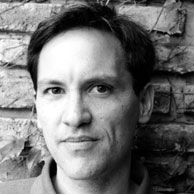
BSO Commissions Chamber Opera by Golijov The hits keep coming for the brilliant young Argentina-born composer Osvaldo Golijov. In the wake of his enormously successful oratorio, ''La pasion segun San Marcos,'' he has just been commissioned by the Boston Symphony Orchestra to write a new hour-long chamber operas that the Tanglewood Music Center will premiere next summer Golijov describes his new opera as a ''Middle Eastern Pieta'' that will deal with parents and the sacrifice of children, which he will depict in both biblical and contemporary terms. (Could this be another John Adams' flap in the making?) The piece is co-commissioned by the BSO, Lincoln Center, and the Los Angeles Philharmonic. Dawn Upshaw will play the leading role in the and Robert Spano will conduct. The opera will be written for a chamber orchestra and a cast of 12-16 singers. These are the first operas commissioned by the BSO for the Tanglewood Music Center, though one of the most notable events in Tanglewood's history was the American premiere of Benjamin Britten's ''Peter Grimes,'' commissioned by BSO music director Serge Koussevitzky. Golijov's music has been performed at important concert halls and festivals around the world. He was born in Argentina and lived both there and in Jerusalem before moving to the U.S. in 1986, studying with George Crumb (earning a Ph.D. at University of Pennsylvania) and with Lukas Foss and Oliver Knussen at Tanglewood, where he received the Koussevitzky Composition Prize. His
diverse collaborations include work with the Kronos Quartet, the Cleveland
and St. Lawrence string quartets, conductors Oliver Knussen and Helmut
Rilling, clarinetists Giora Feidman and David Krakauer, the Romanian gypsy
band Taraf de
Classical Grammy Winners
|
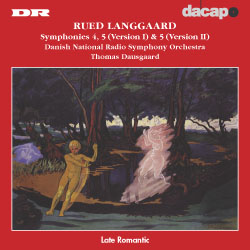
Symphonies 4 & 5 Composer: Rued Langgaard Performers: Dausgaard, Danish Radio Symphony Da Capo [Naxos] - #8224215 Langgard is a lonely figure in Danish music primarily because he was the only Dane to go all the way with Late Romanticism and the only one to say that Carl Neilsen was pretty much an overrated windbag whose music was unnecessarily obtuse. In 1940 he was engaged for the first time in an official capacity, as the cathedral organist in Ribe, far from the music life of the capital. And there he lived, a bitter man, until his death. Nonetheless, he wrote over 400 works: sixteen symphonies and other pieces, many of them like the symphonies recorded here, plain old masterpieces. |
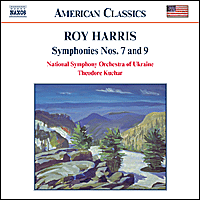
Symphonies 7 & 9 Composer: Roy Harris Performer(s): Kuchar, Nat'l So of Ukraine Naxos - #8559050 Roy
Harris's Third Symphony
|
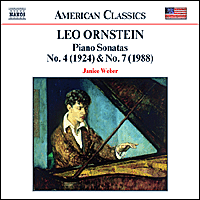
Piano Sonatas 4 & 7 Composer: Leo Ornstein Performer(s): Janice Weber Naxos - #8559104 When Russian born composer and pianist Leo Ornstein died in February at109 years old, he left behind one of the strangest legacies in music history. At the height of his career, he abruptly ceased performing and quietly faded into semi-obscurity, only to be "re-discovered" every 15 years or so. This disc reflects opposite ends of Ornstein's career--the 1924 Sonata No. 4 is from his radical "futurist" period; No. 7, from 1988, is more traditional but no less engaging. Janice Weber's reading makes it clear that when Ornstein composed, a genius was at work. |
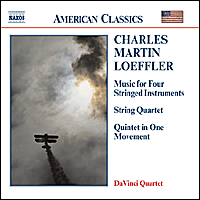
Music for 4 Stringed Instruments Composer: Charlies Martin Loeffler Performer(s): Da Vinci Quartet Naxos - #8559077 Loeffler's brand of lush late Romanticism was still in bloom when he died in 1935 and he was regarded as one of America's best composers. Today, he is forgotten which is really a oversight because--based on the evidence of this fine recording, at least--he was an American Vaughan Williams and music this beautiful deserves to be heard even if it's a bit too easy to like. |
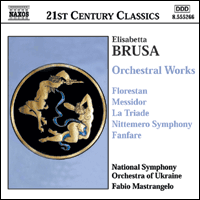
Orchestral Works Composer: Elisaetta Brusa Performer(s): Mastrangelo, Nat'l So of Ukraine Naxos - #8555266 Call it Neo-Tonal or Neo-Romantic, Brusa's pieces for orchestra break no new ground but they have a kind of formal academic elegance that seems more German than Italian in temperament but demonstrates a lively, intelligent mind at work. |
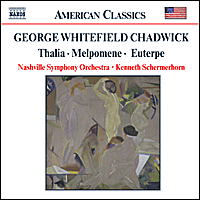
Orchestral Works Composer: George Whitefield Chadwick Performer: Schermerhorn, Nashville Sym Orch Naxos - #8559117 Chadwick is considered the first composer of concert music whose works often show the snap, the wit, the independence of the American spirit. During his career, he modernized the New England Conservatory, taught several generations of American composers, and was a pioneer in making professional instruction available to women and racial minorities. Terrific performances from the first-rate Nashville Symphony. |
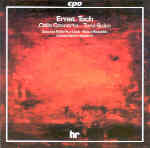
Cello Concerto Composer: Ernst Toch Mutare Ensemble, Muller-Hornbach Cpo Records - #999688 cpo continues to make the case for Toch as a neglected modernist master whose serious work was obscured by his success as a Hollywood film composer. Most of releases is this series have been convincing but this one is somewhat disappointing. The Cello Concerto goes off in too many directions and could have used a good editing. Plus, the sound quality on this recording is strange. Can't put my finger on it, but it's strange.
|
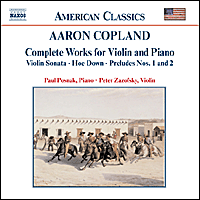
Complete Works for Violin & Piano Composer: Aaron Copland, Posnak, Zazofsky Naxos - #8559102 Copland is most known for his ballets and grand orchestral pieces but he often used small chamber works as building blocks to larger concepts. Most interesting here are the arrangements for violin and piano for well-known pieces of Rodeo and Billy the Kid. |
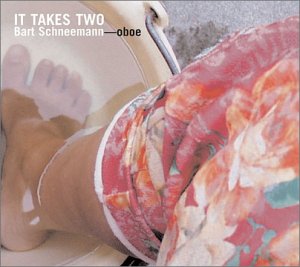
It Takes Two Performer(s): Bart Schneemann Channel Classics - #18598 Have oboe, will travel should be Bart Schneemann motto in this delicious set of duos with some of the world's finest musicians on instruments ranging from the clarinet and the viola to the marimba and the bandoneon. The composers are brand names all--from Andriessen and Bartok to Piazzolla to Vanghan Williams. Most inventive. Our personal favorite of the month. |
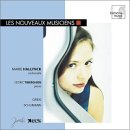
Cello Sonata / Cello Works Composers: Schumann, Grieg Performers: Marie Hallynck, Tiberghien Harmonia Mundi Franc - #911779 Harmonia mundi's Les Nouveaux Musiciens features the young Belgian/French cellist Marie Hallynck in stunning accounts of Schumann' s "Adagio and Allegro," "Phantasienstke," and "Funf Stucke im Volkston" for cello and piano, as well as Grieg's "Sonate Pour Violoncelle et Piano." Our kind of easy listening. |
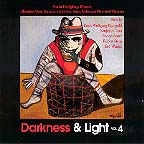
Darkness & Light 4 ComposerPerformer(s): Weiner, Starer, Stern, Korngold, Lees, Holt Albany Music Dist. - #518 The latest release from the Chamber Music Series at the United States Holocaust Memorial Museum is highlighted by the stunningly original "Piano Trio No. 2 "Silent Voices" (1998) by Benjamin Lees. Anguished and almost unbearably intense, Lees crams more drama, passion and empathy into this 14-minute piece than many composers muster in a lifetime. |
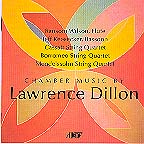
Chamber Music Composer: Lawrence Dillon Cassatt String Quartet, Borromeo String Quartet, Mendelssohn String Quartet In 1985, Lawrence Dillon became the youngest composer to earn a doctorate at the Juilliard School. He studied privately with Vincent Persichetti, and in classes with Milton Babbitt, Elliott Carter, David Diamond and Roger Sessions. Upon graduation, he was appointed to the Juilliard faculty. He is currently Assistant Dean at the North Carolina School of the Arts where he is also Composer-in-Residence and conductor of the contemporary music ensemble. The three pieces recorded here might be considered genre-bending in that they attempt to blend elements of post-modernism and older forms like romanticism. |
 |
Publisher: Duane Harper Grant (212) 582-4153 Editor: Jerry Bowles (212) 582-3791 Contributing Editor: Deborah Kravetz (C) Sequenza/21 LLC 2000 |
 |
Search WWW Search www.sequenza21.com |